This sermon was preached on June 21, 2015, at Winnetka Presbyterian Church. My text was Mark 4:35-41. You can listen to it (the sermon starts around the 2 minute mark), and read it, below.
[audio:http://pomomusings.com/wp-content/mp3/It-is-Time-to-Speak.mp3]This morning, Caleb started yelling, “DADDY!†around 6:00am. That’s pretty normal these days. Way earlier than I would like, but that’s what we’re dealing with. I was able to walk into his room, help him get ready for church, and bring him with me this morning. He’s my son. I’m his dad. It’s Father’s Day today – and this is the “Stanley/Manley Cup†he made for me at camp this past week.
Millions of children woke up this morning and gave their dads hugs and wished them, “Happy Father’s Day.â€
Unfortunately, for Reverend Clementa Pinckney’s children, Eliana and Milana, they could not wish their father “Happy Father’s Day†this morning.
Rev. Daniel L. Simmons Sr.’s children, Daniel Jr. and Rose, are also without a father today. And many more are grieving the tragic deaths of Susie Jackson, Depayne Middleton-Doctor, Ethel Lee Lance, Myra Thompson, Tywanza Sanders, Cynthia Hurd and Sharonda Coleman-Singleton.
These 9 people lost their lives when 21-yr old Dylann Storm Roof shot and killed them during a Bible study at the Emanuel African Methodist Episcopal Church in Charleston, South Carolina, affectionately referred to as Mother Emanuel.
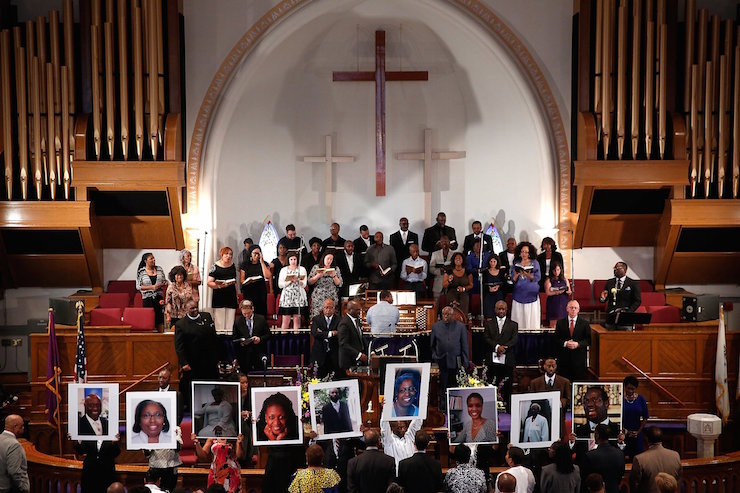
“Let’s cross over to the other side.†It was Jesus’ idea – to cross over to the other side. And so the disciples jumped on boats and began to travel across the lake.
As the disciples began their journey to the other side, the storm came out of nowhere – the wind was strong, blowing the boat; the waves were high, crashing into the boat; and water was filling the boat.
Do you not care that we are perishing?
This was the disciples’ question, but over the course of the past week, this is the question I’ve heard on the lips of so many black women and men in our country as well.
Do you not care that we are perishing?
Do you not care that our daughters and sons are being killed? Do you not care that mothers and fathers are shot while attending a Bible Study in what is supposed to be a sacred space and a sanctuary? Do you not care that African Americans are incarcerated at nearly six times the rate of whites? Do you not care that one in three black males born today can expect to spend time in prison during his lifetime?
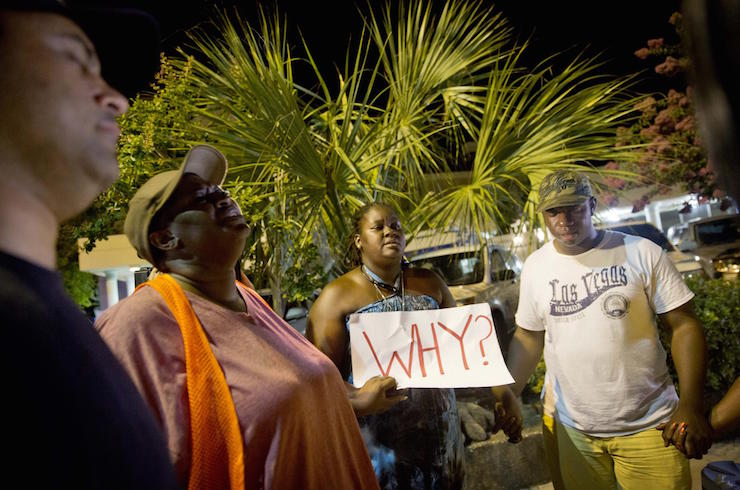
Amidst these questions we ask ourselves today, and amidst the question the disciples asked, we find Jesus asleep on the boat. Is Jesus doing this to test the disciples and their faith? Did he just doze off? There are, of course, many possibilities here, but I really resonate with what Lutheran theologian, John Nunes, says about this passage:
Some storms are natural; others are humanly manufactured, like the wickedness we witnessed in Charleston this week. Where is Jesus? Asleep in the back of the boat? Once awakened he challenges the disciples, “Why are you afraid?†I hear him saying: “Don’t let any terror take away your faith, your commitment to go over to the other side.â€
Jesus speaks commandingly, directly to the storm: “Peace! Be still!†Peace is never passive, never merely an absence of conflict. It is the presence of the Spirit who charges us, despite storms: “Pursue peace with everyone!†(Hebrews 12:14). The Greek verb here means to aggressively go after something deeply cherished.
Humans must practice a peace that’s more than a status quo calm. God’s peace speaks into the epicenter of the old habits, old hatreds, and old fears that eat our best intentions for lunch; including the old racism re-building the dividing walls that Jesus demolished with his death and resurrection.
Do you not care that we are perishing?
The Mark 4 reading this morning is from the Revised Common Lectionary, so many other friends and colleagues of mine are preaching on this text today. As is often the case, people are all going in different directions with the text, trying to look at the ways in which it speaks to the act of terrorism committed in Charleston.
For some, their focus was on the storm, and the ways in which we respond to the storms in our lives and in the lives of those around us.
For others, it was the disciples question – Do you not care that we are perishing? – and the realization that that very question is one which the black community has been asking for hundreds of years. And as we think of that question coming from the black community – I think it’s important for each and every one of us to think about how we’d answer it. Of course we all want to say, “Of COURSE we care.†But…do our actions line up with that?
One of the most interesting perspectives I read came from a friend who serves downtown at Fourth Presbyterian Church, Layton Williams. She was interested in the fact that Jesus is just…asleep in the boat; asleep during the raging of the storm; asleep during the fear and cries of the disciples, his friends. What’s up with that?
One of the most common analogies for the church in the world today is that we are the Body of Christ. And so, perhaps if we truly are the Body of Christ in the world right now, just like Jesus was asleep on the boat amidst the storm, maybe we are the ones who are asleep on the boat. Maybe we are the ones who are not hearing the fear and cries of our friends – of our brothers and sisters.
The parallel breaks down a bit, because we’re obviously not wanting to equate ourselves with Jesus – but collectively, if we are the Body of Christ – maybe we’re the ones who need to wake up and begin to help deal with the storm. Maybe we’re the ones who need to call for this active peace, which is more than a status quo calm – a peace that must be fought for. Maybe we’re the ones who need to realize we’re all in the same boat, and that boat is getting beat up pretty bad right now.
The waves are crashing into it, it’s starting to sink, and we need to wake up and deal with it!
Do you not care that we are perishing?
“They have something to say to each of us in their death.
They have something to say to every minister of the Gospel who has remained silent behind the safe security of stained-glass windows.
They have something to say to every politician who has fed his constituents the stale bread of racism…
They say to each of us, black and white alike, that we must substitute courage for caution.
They say to us that we must be concerned not merely about who murdered them, but about the system, the way of life, the philosophy which produced the murderers.â€
As I read this quote yesterday – I found it to be helpful in terms of thinking about the events of this past week. The deaths of the 9 from Mother Emanuel call all ministers of the Gospel to speak out. Their deaths call all politicians to wake up…and we’ve seen that, haven’t we? When the President of the Southern Baptist Ethics & Religious Liberty Commission, Russell Moore, says it’s time for the Confederate Flag to come down – something is happening. When Republican state senators from South Carolina, and former Presidential Candidate Mitt Romney are all calling for the removal of the Confederate Flag…something is happening.
We are called to be filled with courage, and to address the systemic racism that is hardwired into so many of our structures.
However, this quote wasn’t written this past week. It was written 52 years ago, and was part of the eulogy that Martin Luther King, Jr. gave after the Birmingham Church bombing.
And now…52 years later…one could argue that nothing has changed.
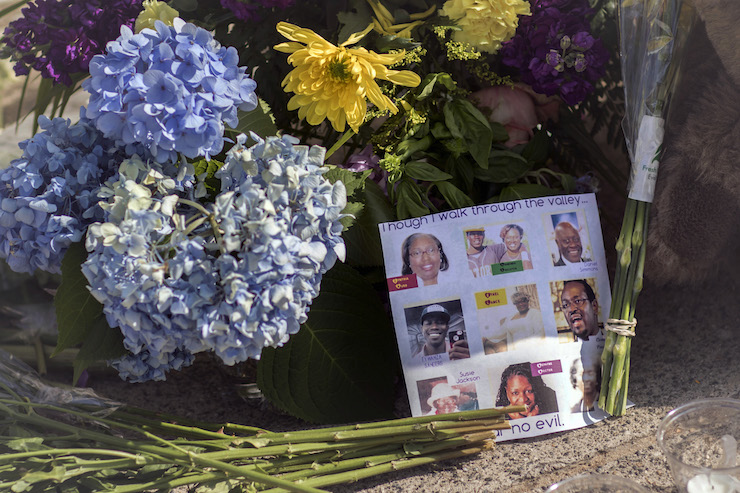
Do you not care that we are perishing?
Unfortunately – this type of violence, this type of hate crime, this type of domestic terrorism, does not surprise us. It is horrific. It is sad. It is downright evil.
And yet…still…it does not surprise us.
In his address on Thursday, President Obama said this about the shooting in Charleston:
“Now is the time for mourning and for healing, but let’s be clear: at some point, we as a country will have to reckon with the fact that this type of mass violence does not happen in other advanced countries. It doesn’t happen in other places with this kind of frequency. And it is in our power to do something about it.â€
This doesn’t happen in other advanced countries.
And yet – it is the norm for us. And it doesn’t surprise us.
Some of you may have watched Jon Stewart’s opening monologue on The Daily Show this past Thursday evening. It’s worth watching in its entirety, and this is how Stewart begins:
I have no jokes tonight…I honestly have nothing…other than, just…sadness once again that we have to peer into the abyss of the depraved violence that we do to each other, and the nexus of a, just, gaping racial wound that will not heal, yet we pretend doesn’t exist. And I’m confident, though, that by acknowledging it, by staring into that and seeing it for what it is, we still won’t do jack. Yeah. That’s us. And that’s the part that blows my mind.
The racially-motivated violence against people of color in our country has been the norm for far too long, and yet, many are just now realizing this sad reality.
Trayvon Martin. Michael Brown. Eric Garner. Tamir Rice. Sean Bell. John Crawford. The list goes on and on and on…
These are not isolated incidents. These are not just unfortunate accidents.
These are part of a larger, systemic problem in our country: racism fueled by white supremacy. This dates back to the founding of our country, and is a part of our history that we must own and be accountable for, if we are ever going to move forward.
We should all be outraged by what happened at Mother Emanuel this past Wednesday evening. We should all be outraged at the racist ideology that was not confronted enough by those who knew the perpetrator. We should all be outraged at the racist imagery of the Confederate Flag that continues to fly outside the South Carolina Statehouse.
Do you not care that we are perishing?
And so we must not remain silent. We must share our outrage and our anger. We must first confront the racist thoughts and stereotypes we all have. We must also confront the racist comments we hear around us – whether it’s a stranger saying something in passing, or our parents or our children.
It is time to speak.
But first, a confession.
As I’ve been going through my office, cleaning up papers, sorting through documents on my computer, I’ve run across the Prayers of the People I first offered when I started at Winnetka Presbyterian. I remember sitting down on Friday or Saturday nights to finish the prayers, and checking out CNN.com to make sure I included the latest updates to stories I wanted to lift up in the prayers.
I specifically remember, the first couple weeks, going through and counting how many young black men and women had been killed over the course of the weekend, especially during the summers, and lifting up their names in my prayers. I would mention that 10 were shot, and 4 killed. Or that our prayers should be with the family and friends of…and then name those who had lost their lives to violence.
But…then I stopped. I still prayed specifically for gun violence here in Chicago, and for deaths of innocent people, but I stopped naming them.
And then…after awhile longer…I stopped including that in my prayers each week. I still prayed occasionally for gun violence, but it wasn’t a focus. In as little as 6–9 months, I’d become a bit numb to the continuous stream of names of those people of color who had been killed.
There is a hashtag on Twitter right now, called #saytheirnames. It is an effort to honor those who tragically lost their lives this past week in Charleston. It’s important to say their names. It’s important to remember that Black Lives Matter.
And so, this morning, once again, we #saytheirnames:
Sharonda Coleman-Singleton
Cynthia Hurd
Susie Jackson
Ethel Lee Lance
Depayne Middleton-Doctor
Clementa Pinckney
Tywanza Sanders
Daniel L. Simmons
Myra Thompson
Do you not care that we are perishing?
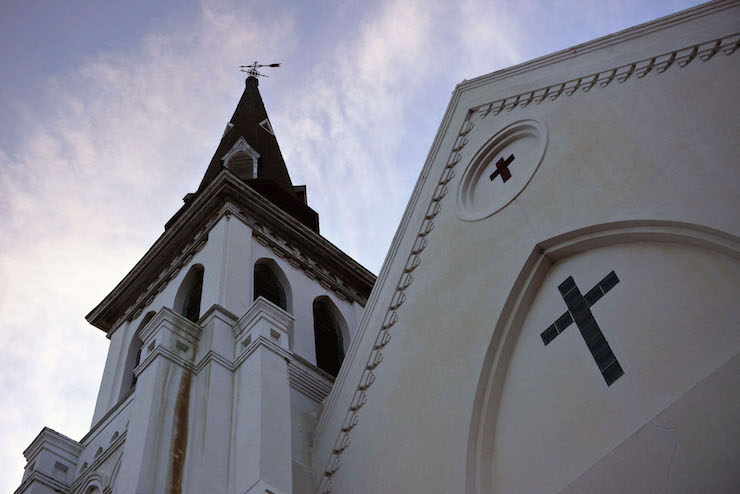
I’m sure you’ve seen all of the articles about the shooting: attempts to understand just how the Confederate Flag could remain flying in South Carolina, and thoughtful articles about racism. I’ve seen tons, shared many, and read some. One of the best I read was from another Presbyterian pastor.
I want you all to hear these words from Rev. Tawnya Denise Anderson this morning. Her post is entitled: “‘Allies,’ the Time For Your Silence Has Expired.†After reading it, I felt a bit convicted. Hell, I felt strongly convicted. Listen now to a few portions of that post:
I remember when the news out of Ferguson, MO first came to us. I heard White friends and colleagues encourage each other to sit in a posture of listening. I honor that listening. I honor the desire to be in solidarity through understanding. I honor that they wanted to avoid any semblance of saviorism.
White allies, I thank you for your thoughtfulness in this regard. Now allow me to be your stopwatch; Time’s up.
At this point, I’m not interested in your listening. I think the danger in this listening posture is, while it seems like the mindful and conscientious thing to do, it can also be far too convenient. It’s a great way of doing nothing. For the sake of finding the right action, you take no action instead.
Many of you have been on it for some time now, working in solidarity with people of color. You have been in the trenches from the beginning (or your beginning). I don’t discount you, but I also caution you to not be self-congratulatory. You’ve left some folks behind, folks who call themselves “allies.â€
I have a love-hate relationship with that word, ally. We should apply the same rule to it as we do to nicknames. You can’t give yourself a nickname; other people give it to you. To give it to yourself comes off as pretentious. It’s the same with self-proclaimed “allies.†I know you mean well, but what about your life demonstrates that you walk in solidarity with others who experience life differently from you because of their skin color, legal status, or sexual orientation? Please don’t call yourself my ally if your uncle’s racist jokes go unchecked in your presence. Please don’t call yourself my ally if you say something insensitive, I call you on it, and all you can do is brush it off and say, “Girl, but you know I love my Black people!†Don’t do it. Whether you got in the game early or late, it’s important to simply get in the game.
As you reflect on those words for yourself, individually, and as you reflect as a part of the Winnetka Presbyterian community…the questions to consider are:
- What does it look like for us to get in the game?
- What does it look like for us to truly be allies?
- What does it look like for us to stop just listening and to enter into meaningful support and action?
This is a church with a great amount of power, influence and financial resources – how are we using those gifts to fight racism in Winnetka, the North Shore, Chicago and beyond?
I know it’s perhaps a bit odd for me to want to provide you with a list of actionable items on my second to last Sunday with you – but as I was thinking about this call to action – I knew that it wouldn’t be right to just end a sermon with “So, let’s go do something….!†and not share any ideas about what this church could do.
Let me first say, I believe everyone has their own unique gifts and skills, which will obviously impact what you feel called to do to fight racism, but here are some ideas I wanted to share that I gathered yesterday:
- You could look at the work of organizations like #BlackLivesMatter and other faith groups who are addressing a post-Ferguson world.
- Perhaps an adult education series could be done on racism and the church. This could be a primer, just so that everyone begins to become comfortable with the language of conversations about race and racism. Small groups could read a specific book together, like The New Jim Crow, and conversations could begin.
- Perhaps some money could be set aside to bring in a trainer to lead an anti-racism workshop at the church – something which could be available to all interested.
- Maybe a small group of WPC folks could get together and find out how Winnetka residents, and those in the broader North Shore, participate in, benefit from, or are penalized by institutionalized racism.
- One easy thing to do is start listening and reading to different voices. For me, that meant going through Twitter and Facebook and following and liking a lot of African-American authors, political activists and others who have opened me up to new points of view and understandings and a different view of the world.
- And I think we all know some of the deepest transformation occurs through relationships. How many of you have a good friend who is a different race or class than you are? And I don’t mean a co-worker, or someone who is just an acquaintance. I mean a good friend who just might see the world very differently than you do. If you don’t have that person – go out and find them! Now, that sounds a little awkward and you might ask yourself, “How do I do that?†Well, it will be a little awkward. But breaking through that awkwardness can bring about incredible depth and transformation.
Do you not care that we are perishing?
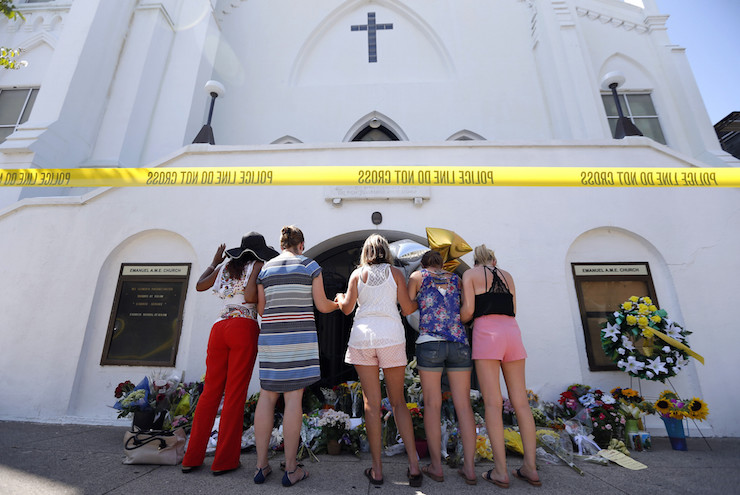
Last week we talked about how the Psalms lead us through different stages of our lives: orientation, disorientation and reorientation.
This week has certainly been a period of disorientation for the members and friends of Mother Emanuel AME Church in Charleston. This has been a period filled with so much: grief, rage, frustration, anger, confusion, despair and more.
The one hope that we have from the Psalms is that disorientation is always followed by reorientation – of peace and stillness. And now, more than ever, it’s up to each and every one of us – following in the footsteps of Jesus the Christ – to work toward that reorientation. To work toward reconciliation. To put our anger and rage to work, as we seek to dismantle the systems of racism and oppression that still exist in our country.
Let us go out and seek action. Let us go out and seek justice. Let us go out and seek equality for all.
Yes, we can agree that ALL LIVES MATTER – but until we can all agree and proclaim that BLACK LIVES MATTER, we’ll continue to hear about these tragedies…and they’ll continue to not surprise us.
Do you not care that we are perishing?
How will you answer that question?